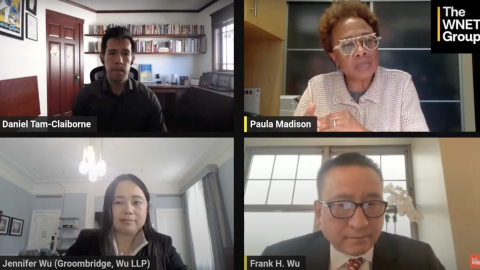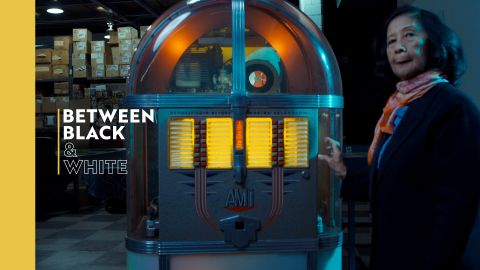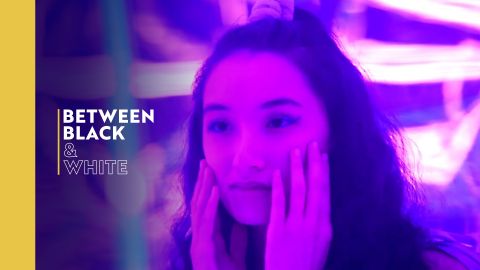Newscaster:There has been an alarming spike in the number of attacks against some in the Asian community.
Tacing Parker, Sr Executive Director, Bayview Hunters Point YMCA: I would be lying if I told you that, you know, black and Asian folks are just all this great peace and harmony all the time because that’s not true.
Shamann Walton, San Francisco Board of Supervisors [00:00:50] When something happens, a member of any community is harmed. You know, the first thing everyone wants to do, of course, is place blame and find out who did something.
Sarah Wan, Executive Director, Community Youth Center of San Francisco: I think today we realize that both communities are facing the same challenge. We both face violence. We need to help each other out.
Eddie Zheng: It’s about how do we nurture trust? How do we build trust? My name is Eddie Zheng. I’m the president and founder of the New Breath Foundation. New Breath for me is hope and new beginnings. I came to the US from Guangzhou, China at the age of 12 because my grandparents wanted me and my family to have a better life here in the United States. At the age of 16, me and two of the people that I associated with committed a crime, a home invasion robbery that led to kidnap, to commit robbery. And I end up spending 21 years incarcerated. So I grew up literally from age 16 to age 37 in the prison system. When I was inside, once I was able to start getting educated and really had the opportunity to reflect on my actions, I was able to find my purpose in life, which is to serve the youth and the community.
Sarah Wan, Executive Director, Community Youth Center of San Francisco: I think in 2010. It’s a pretty key period that happened within the Asian community, especially our elders in a Bayview district.
Eddie Zheng: There was a lot of fear in the community. This video that went viral was this African-American woman, and this Chinese woman was on the bus. They had an argument. There was another incident. The Chinese woman was standing on the platform. And then this one young person would push this woman into oncoming traffic.
Sarah: A lot has been target or like really finger pointing to the African-American community saying that they have been bullying the Asian community.
Eddie Zheng: There’s this phrase that was coined when they were talking about Asian Americans. They call us the walking ATMs. So they what basically what they say is like they got money. Those people got money. If you rob them, you know, they have cash in the bank. Just like a walk in ATM.
Shamann Walton, San Francisco Board of Supervisors: Eddie is someone who, like me, wants to see our communities come together and understands that we are better together versus being divided regardless of what narratives some people want to put out there about how we are as communities.
Shamann Walton, San Francisco Board of Supervisors: Sometimes people tend to want to blame whole races of people, whole communities, and that’s the hard part about this work. I’m originally from Bayview Hunters Point. Lived there early part of my years. Bayview Hunters Point is really the last place where you can find a good percentage of the black population. It’s about 20%, as most people probably know by now, we have less than 5% black population here in San Francisco.
Tacing Parker, Sr Executive Director, Bayview Hunters Point YMCA: You see people who have called this place home when no one wanted to call this place home, when no one cared about this neighborhood, when the city wouldn’t even recognize the need and the beauty in this community. Black people were here.
Eddie Zheng: In early 2000. Just a lot of immigrants, Chinese immigrants, other immigrants started moving into the Bayview.
Sarah Wan, Executive Director, Community Youth Center of San Francisco: It is very challenging. There’s a language barrier. We can’t communicate what’s going on and we do not know how to build bridges or reach out to them. So they felt like that with a group of stranger coming in that they feel like they’re being displaced and they think being disrespected.
Tacing Parker, Sr Executive Director, Bayview Hunters Point YMCA: I’ve seen a lot that has happened. You could talk about it and cry about it and we need to do those things. But what are we going to do to bridge the gap?
Eddie Zheng: I think the first thing we started out with was a multicultural youth leadership program. We need to create spaces for cross-cultural engagement. We need to support our young people. We need to start doing more work with the African-American community in that space. It goes back to what I learned from prison, is that we have to invest our young people to give them the knowledge and the importance about, you know, each other’s history. How do we bring each other together and start building?
Shamann Walton, San Francisco Board of Supervisors: If we don’t spend time together? If we try to avoid each other’s communities, then it’s easy for people to divide us and create their own narratives. And we have to work to try to change that.
Event Speaker: And we are celebrating.
Event Speaker: Together for the 13th year. And that’s what it’s about, coming together through thick and thin. Through pandemics. Through all. And that’s what we did, right, Eddie?
Eddie Zheng: This is our 13th year.
Event Speaker: 13th 1-3.
Tacing Parker, Sr Executive Director, Bayview Hunters Point YMCA: There can be a lot of times when you feel defeated because you might do so much great work, you know, and then something happens.
Event Speaker: We have a moment of silence for our brothers and sisters from the Monterey Park and the Half Moon Bay.
Tacing Parker, Sr Executive Director, Bayview Hunters Point YMCA: It can’t just be an event, right? It takes the long haul to really be able to effect the change that’s needed.
Shamann Walton, San Francisco Board of Supervisors: We cannot let them win. That’s why we will continue to celebrate our unity as communities.
Shamann Walton, San Francisco Board of Supervisors: So the worst thing we could do is turn against each other. The best thing we can do is focus on learning more about each other and coming together.
Graphic: Eddie Zheng founded The New Breath Foundation in 2017, awarding $3.8 million so far to AAPI community organizations supporting formerly incarcerated people, violence prevention and bridge-building programs.
Eddie Zheng [00:07:08] I’m going to do my best to make this world a better place. How can I continue to nurture trust so that we can continue to fight for our collective liberation and not individual liberation? I feel like there’s hope.



